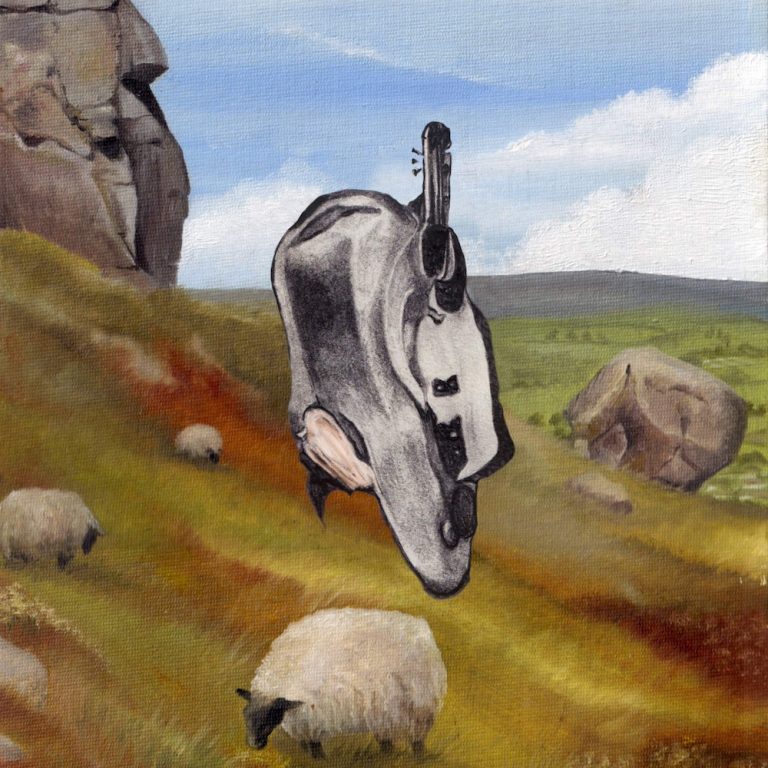Where does one start with English Teacher? The Leeds quartet have been ticking off major milestones with startling frequency and even greater aplomb over the past few years. To summarise: Form a band, check. Release one of the year’s buzziest singles, check. Play Glastonbury, check. Grace the cover of NME, check. Appear on national TV with Jools Holland, check.
Next on the list, of course, is to release a critically acclaimed debut album.
However, to suggest that English Teacher are only concerned with box-ticking would be foolish. The band have come this far by trusting their instincts and pursuing singularity. Of course they have released some ‘Indie Bangers’ along the way, but debut album This Could Be Texas, for the most part, eschews these crowd-pleasers in search of something more gripping.
“Nearly Daffodils”, for example, finds bassist Nick Eden in an unbreakable trance of whirling slides. Lewis Whiting, meanwhile, punctuates the tune with understated guitar twangs, allowing Eden the room to breathe and manoeuvre throughout the song. This is a theme carried across the record; a band playing for each other, contributing parts that best serve the song and not one’s ego. Eden himself sits back at times, happy to witness the math rock arpeggios radiating from Whiting’s telecaster on “Albatross”, before stepping up to push the tune forward to a hefty end.
Live show favourite “Broken Biscuits” makes an appearance too. It’s emblematic of the record as a whole, with piano refrains that wrap themselves around duelling guitar riffs. There’s even moments of squealing saxophone in a progressive song that scurries resetlessly from section to section. To top it off, singer Lily Fontaine utilises wordplay to devastating effect on a tale that feels all too true.
Fontaine has already carved out a reputation as a promising lyricist; a sort of post-modern romantic who holds aloft zeitgeisty themes such as feminism and race to be shown in a new light. This Could Be Texas only strengthens her reputation. Here is a series of absurdist vignettes, each of which sees her attempt to piece together fragments of society from a unique perspective. Brimming with literary references and grand, abstract statements, the lyrics here are both personal and universal. “Steve’s mate’s son used to play in The Fall,” Fontaine tells us on “Albert Road”, before claiming “I’ve got a war of roses for a head / I am the stem and I am the thorn.” It’s jarring, but there’s a familiarity in this shift; our own thoughts work this way too, jumping from memories to political concepts to what we might have for dinner. With these contrasts, Fontaine allows us to wander through the ginnels of her mind.
There’s also a constant desire to define oneself by what one is and isn’t. “I’m not Crying, You’re Crying” features an entire verse of “I’m not…” statements, while “The World’s Biggest Paving Slab” is almost entirely the opposite – “I am the Pendle Witches, John Simm / And I am Lee Ingleby.” Outsourcing identity in this way seems like an attempt to find one’s place in an abrasive, nonsensical world. It chimes with insecurities and the contemporary issue of identity politics. Fontaine, like many great indie lyricists of times gone by, hits upon a subject that will appeal to those who feel they are on the outside. What lifts her above many others is the humour and poignancy with which she handles it.
Just a couple of years ago English Teacher were struggling to find their sound, flitting between the operatic rock of “Wallace” and the quirky post-punk of “A55”. They had talent, sure, but the direction was unclear. Now they have combined the best of all their previous efforts into a cohesive chamber-pop sound. It can be heard in the surging, elegant strings of “Best Tears of Your Life”, and the discordant carnage of the title track’s breakdown. Even “Sideboob”, a rework of previous tune, is polished and improved upon here. This is no longer a band finding their sound, this is a band perfecting it.
Their raucous youthfulness has faded slightly. This is a far more mellow, melancholic album than many might have expected, with naïve piano lines lending a childlike curiosity to gorgeous soundscapes, full of rustic guitar plucks and absorbing basslines. This Could Be Texas is akin to a display cabinet of curious carvings, which at first glance appear to resemble everyday objects. Each is carefully whittled down from a greater whole, full of intricate marks and small engravings which reappear across the collection, connecting them somehow. Endlessly considered and, on further inspection, not everyday at all, the items quietly subvert expectations and reveal their beauty, producing rare emotional resonance on just a single inspection. English Teacher’s debut album is delicate, accomplished, and complete. Check.


